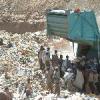
Algae Integrated Wastewater Management System by Algaetech
 2013wastemanagementjudges 2013wastemanagementjudges Jul 9, 2013 05:52 |
Congratulations, your proposal has been named a finalist in the Climate CoLab Waste management contest. You have until July 20th to edit your proposal. The Judges suggest that you focus your edits on the topics listed below.
Use of algae to clean waste water of nutrients and to grow algae is not a new idea, but it is a potentially good one. To date no one seems to have been able to separate the high value long chain oils from the water without using enormous amounts of energy or high cost processes. An interesting approach mentioned in the proposal is that instead of trying to turn the algae into bio-diesel, they instead plan to degrade it anaerobically into methane. That was an intriguing idea, and it would be helpful to have more details on how that process would work.
Other specific questions:
- It turns out that algae are more complex than we knew, and the economic value is often in some of the chemicals that get produced. Another lucrative product from algae is aquaculture feed. It may be that bio-diesel or methane end up as by-products of a process that yields other products that have more economic value. It would be helpful if the proposal authors discussed the potential of other products besides bio-diesel and methane.
- It is also important to provide some cost estimates: an overview of the investment required and ongoing operational costs and comparative costing of alternative processes under consideration.
|
 2013wastemanagementjudges 2013wastemanagementjudges Jul 31, 2013 02:02 |
Interesting concept, but still needs to explain separation process more clearly -- this is the big stumbling block for this process of using algae for biofuels.
|
 Mark Capron Aug 18, 2013 06:38 |
This is very doable. I took a one-week class in algae wastewater treatment at UC Berkeley perhaps 20 years ago. There were a few small WWTPs in Northern Califoria using algae ponds.
Now, the algae would compliment an up-front biogas producing anaerobic digestion process.
|
 Tom Mallard Aug 26, 2013 12:43 |
Mark, thanks for the comment, and yes this is designed to work with a solids removal step for digestion, yet for households that's not a lot of gas, OK for the kitchen maybe not enough for hot-water + laundry.
Also, people think ponds but they don't grow fast enough for land footprint, total growing day hours, lighting and temperature control and that led me and others to bioreactors that scale to go from households to cities and came to the the cube idea, they stack, are densely lighted, far less power to aerate & pump, insulated so conserves heat to stack them.
For this sytem, it's really a purification system, the water is fully recycled so this concept is different from just making a biofuel which is more an intended result, it's to have a certified water supply under building codes to buy at farm & home supply stores with parts & service so contractors or DIY'ers can install them.
Without that it won't scale and can't make a dent in CO2 reduction for IC-engines like this will. We have to deal with all the engines on the planet non-fossil, this covers a lot of needs.
Everyone that gets this is for being able to make a biofuel for the car from living in a home from purifying the wastewater. For city systems it make sense to assume the algae are tainted and use newer techniques for extracting the oil that have less to digest.
For a small dairy the same system means they can recycle the barn washdown, get a lot of biodiesel to power equipment and heat the barn, and pressing the oil out means you get a good fertilizer from the cakes.
This can be a foundation of a small farm revival by having a way to make fuel for operations on a monthly payment for the system instead of a huge bill for diesel.
|